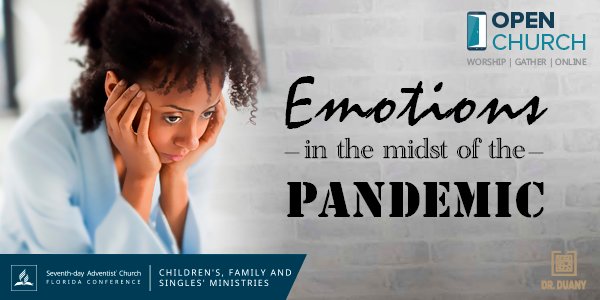How did the night come to your life? The night may have come in the form of a crisis. There are different types of crisis. Situational crisis or developmental crisis. Situational crises are problems and conflicts that come to life in unexpected ways. Developmental crises are crises that we experience as a result of emotional development, family, or personal cycles that we are experiencing through the different stages of our life.
Now, the story takes a very attractive color because even though the night came for Jesus and His disciples, Jesus invites them to go to the other shore of the lake. There are things that Jesus does that do not make sense to the human being. Every time Jesus does something that doesn’t make sense, it’s because he wants to teach us a lesson. The journey on the Lake of Galilee was very uncertain due to many conditions.
The position of the lake could raise storms in unexpected ways. They did not have the navigation instruments that exist today. Their experience as fishermen made the difference. But despite the disadvantages that they had before the night that had come into their lives, Jesus invites them to “go to the other shore of the lake.”
Show faith in times of crisis
Despite the pandemic that has come on the cold night of our lives, Jesus invites us to go to the other shore. This expression, “going to the other shore” is closely connected with the experience of the people of Israel when they were also challenged to “go to the other shore” on their journey to the earthly Canaan. Today, in our journey towards the Heavenly Canaan, God invites us to go to the other shore. The shore of liberation, final victory. The shore of the Heavenly Canaan.
It is interesting to note that despite the beautiful invitation that Jesus makes to his disciples to go to the other shore, the storm arrives. And you have the right to wonder if I am obeying the command of Jesus to go to the other shore. How is it possible for a storm to rise on Jesus’ command? And not only that, with Jesus walking at our side. These questions are very valid.
How to show faith
The truth is that accepting the invitation to be a disciple of Jesus and moving to the other shore does not make us immune to experiencing storms on our journey.
Furthermore, Jesus tells us that it is normal for storms to come into our lives as we travel through the troubled waters to the other shore. “In the world, you will have afflictions,” says Jesus. And isn’t that what we are experiencing today? We are distressed by the storm that has risen in our lives and threatens to destroy us.
This storm has come in the form of COVID-19, a deadly virus that has destroyed cities, systems, and today threatens to sink our lives. A virus that has the most powerful country in the world paralyzed without knowing how to behave in the face of the crisis. We have never experienced a crisis like this one. And the problem is not simply the storm, but the uncertainty that the coronavirus brings.
The coronavirus crisis
Now, how can we live in the midst of the coronavirus storm? If we go to the biblical text, we see the two attitudes that we can take. We see the disciples anxious and desperate because they are afraid that they will lose their lives. And on the other hand, we see Jesus sleeping in the middle of the storm. How is it possible that you can have two such different reactions in the midst of this experience?
It all lies in the way you interpret the storm or crisis that comes into your life. Your thoughts define how you are going to interpret your reality, your crisis. And if we dig a little deeper into this concept, we will find that our thoughts define our emotions and behaviors. Epictetus said: “We are altered not by events, but by the way we interpret events.” In other words, the way I interpret the storm that I am experiencing is going to influence how I am going to feel and how I am going to behave before it.
Let’s go back to the boat, where Jesus and his disciples are facing the storm that came to them in their dark night. In the midst of the storm, the thoughts that the disciples have been thoughts of danger, uncertainty, threat, and death. Those thoughts produce emotions that are not difficult to decipher. Emotions such as fear and anguish at the threat of the storm. And that is why they behave anxiously and try to find solutions to the problem on their own, apart from Jesus.
How did Jesus face the crisis?
Now, let’s analyze the reaction of Jesus, who is in the same boat and experiences the same storm that the disciples are experiencing. What are Jesus’ thoughts about the storm? “My Heavenly Father is in control of my life. I have nothing to fear. “Those thoughts produced emotions of serenity, peace and security. And his behavior was obvious then, in the middle of the storm, Jesus was sleeping.”
Tell me, who can sleep in the middle of the storm? So what can we say made the difference between the disciples’ emotions and behavior and the fact that Jesus was sleeping? The difference was not made by the storm because both groups experienced the same storm. The difference was in the way they interpreted the storm. The disciples interpreted it as a threat to their lives. And Jesus interpreted it as an opportunity to trust more in his Heavenly Father, who cared for His life.
I ask you, in the midst of the night that has come to your being, how do you interpret the COVID-19 storm? Because the thoughts you have about this phenomenon will make the difference between whether you will be anxious and desperate or in peace and tranquility as Jesus was in His storm.
Five step to face the crisis
I want to leave you with five tips. These tips are in the way Paul decided to interpret the storms that came on his dark nights. He says in Philippians 4: 8: “For the rest, brethren, all that is true, all that is honest, all that is just, all that is pure, all that is kind, all that is of good name; if there is any virtue, if something worthy of praise, think of this.”
Label the emotion.
The emotion you are experiencing, such as sadness, anguish, pain, give it a name.
Identify the thoughts that lead you to experience those negative or positive emotions
Ask yourself, do you think about what is honest, fair, pure, kind, or of good name? You cannot change until you are aware of the toxic thought that is leading you to experience the emotion and behavior that you have.
Focus on changing your thoughts
In other words, change your thinking because your thoughts are what define your emotions. Instead of thinking about the lies that Satan has led you to think about, think about the eternal truths we have in God’s promises. First, analyze what the storm, crisis, or problem is that leads you to experience the thought you have in your mind.
Understand that you can never change the storms or crises that come to your life. You can only change the ways you interpret those experiences so that you can experience different emotions. Your biggest problem lies in wanting to control what only God can control. That is the source of the greatest stress you experience in your life.
Thank God for what He has given you
Instead of complaining about what you have lost in the midst of the storm, decide to trust what you have. Make a list of all the things that God has given you. You will discover that you always have more things to be thankful for compared to things you think you don’t have.
Cast all your anxiety on God because He cares for you
The end of the story about the storm you experience today will be defined by how you decide to interpret your storm. The disciples thought of death and pain. Jesus thought of peace and security because His Father was at His side. In the end, Jesus rises and calms the storm. Today, you can get up like Jesus and calm the storm because your God is at your side as a powerful giant and nothing can harm you without His permission.[/vc_column_text][/vc_column][/vc_row]













